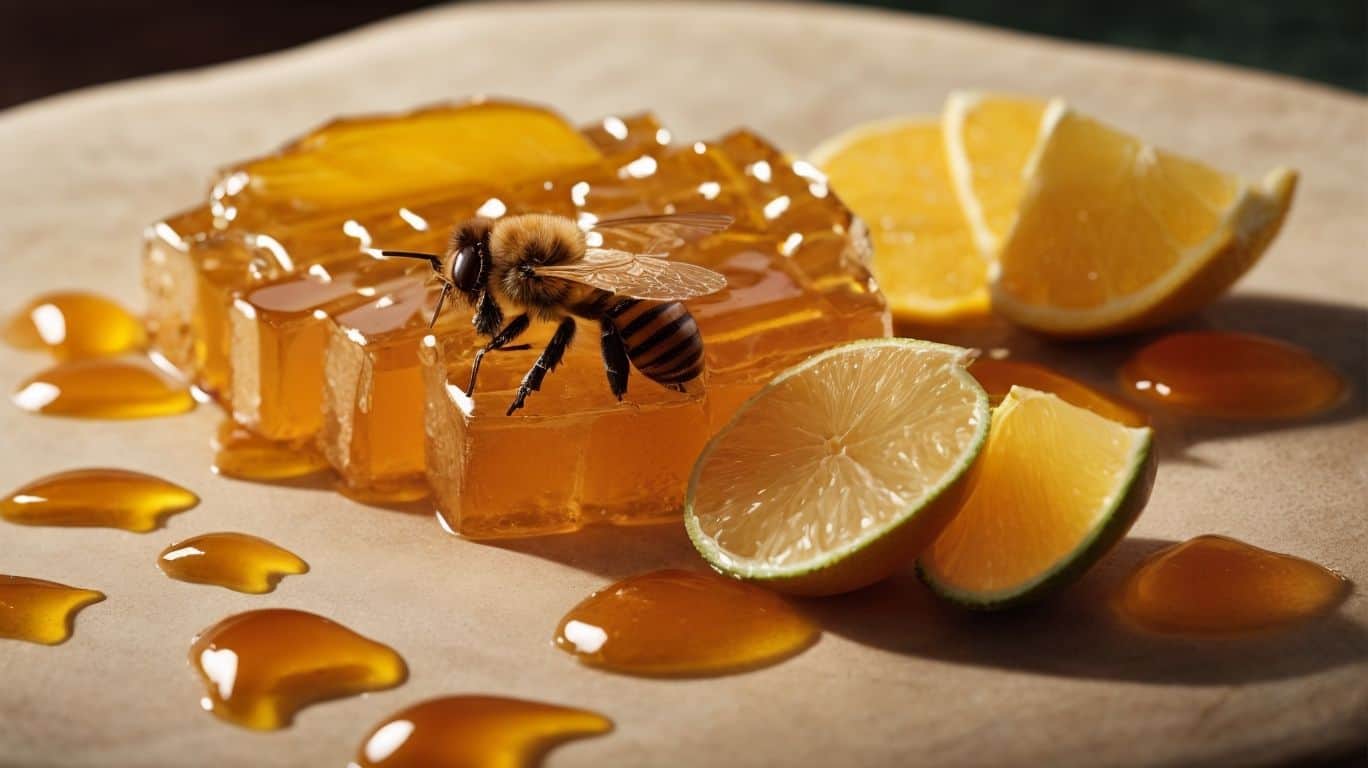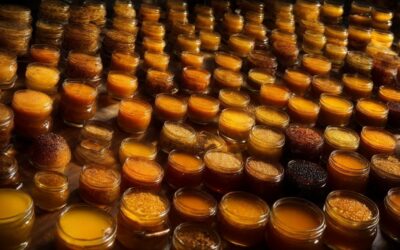Did you know that the sweeteners you use in your coffee or baked goods can have a big impact on your health?
In this article, we’ll dive into a popular debate – Honey vs. Agave – to help you make the best choice for your overall well-being.
If you’re trying to make healthier choices but still want to satisfy your sweet tooth, read on to discover which option may be better for you.
Let’s settle this sweet showdown once and for all.
How are Honey and Agave Produced?
Honey and agave syrup are produced through different processes. Here are the steps involved in their production:
- Honey Production:
- Bees collect nectar from flowers using their long tongues.
- Nectar is stored in a special honey stomach and mixed with enzymes.
- Back at the hive, bees regurgitate the nectar into honeycomb cells.
- Bees fan their wings to evaporate excess moisture, thickening the nectar into honey.
- Finally, bees seal the cells with beeswax to preserve the honey.
- Agave Production:
- Agave plants are harvested by removing the leaves and extracting the core, known as the “piña”.
- The piña is crushed and pressed to extract the sweet juice.
- The juice is heated and filtered to remove impurities.
- Enzymes are added to the juice to convert the carbohydrates into sugars.
- The liquid is then further concentrated to create agave syrup.
These distinct processes result in the unique flavors and characteristics of honey and agave syrup.
What are the Nutritional Differences between Honey and Agave?
Honey and agave have distinct nutritional differences.
- Honey is a natural sweetener that contains small amounts of vitamins and minerals, such as vitamin C, calcium, and iron.
- On the other hand, agave has a lower glycemic index compared to honey, making it a preferable choice for individuals with diabetes or those monitoring their blood sugar levels.
- However, it’s important to note that agave also contains higher quantities of fructose, which may not be suitable for everyone.
When deciding between honey and agave, it’s crucial to consider your specific dietary needs and preferences.
How Do They Compare in Calories and Sugar Content?
When comparing the calories and sugar content of honey and agave, there are some key differences to consider. Here are the steps to make a comparison:
- Calories: Honey contains about 64 calories per tablespoon, while agave has approximately 60 calories per tablespoon.
- Sugar Content: Honey is higher in sugar, with about 17 grams of sugar per tablespoon, compared to agave which has around 16 grams of sugar per tablespoon.
- Glycemic Index: Agave has a lower glycemic index than honey, making it a better option for those concerned about blood sugar levels.
- Nutritional Value: Honey contains small amounts of vitamins and minerals, while agave has minimal nutritional value.
Both honey and agave have been used as sweeteners for centuries. Honey has a rich history dating back to ancient times, with evidence of its use by ancient Egyptians and Greeks.
Agave, on the other hand, has been used for centuries by indigenous people in Mexico. Both sweeteners have their unique characteristics and are enjoyed in various culinary traditions.
Which One is Better for Diabetics?
When it comes to diabetics, honey is a better choice compared to agave due to its lower glycemic index (GI) and higher antioxidant content.
With a GI range of 45-64, honey is less likely to cause blood sugar spikes compared to agave, which has a GI of 10-19. Additionally, honey contains beneficial antioxidants that can help manage diabetes-related complications.
However, it’s important for diabetics to consume honey in moderation and regularly monitor their blood sugar levels. It is recommended to consult with a healthcare professional to determine the best sweetener for individual dietary needs.
Does Honey Have Antibacterial Properties?
Yes, honey does possess antibacterial properties. This is thanks to its low water content and acidic pH, which make it difficult for bacteria to thrive.
Honey also contains hydrogen peroxide, a natural antiseptic, and other antimicrobial compounds that can hinder the growth of certain bacteria.
Due to these properties, honey is a popular home remedy for treating wounds, burns, and infections.
However, it is important to keep in mind that the effectiveness of honey as an antibacterial agent may vary depending on factors such as the type of honey and the specific bacteria involved.
Can Honey Help with Allergies?
Honey has been used as a natural remedy for allergies for centuries. While there is limited scientific evidence, many people believe that consuming local honey can potentially help reduce allergy symptoms.
The theory is that by consuming small amounts of local pollen found in honey, the body builds up a tolerance and becomes less reactive to pollen in the environment.
However, it is important to note that this method may not be effective for everyone, and it is always best to consult with a healthcare professional for personalized advice.
So, while honey may have the potential to help with allergies, its effectiveness may vary from person to person.
What are the Health Benefits of Agave?
Agave is a popular sweetener choice due to its various health benefits. With a low glycemic index, it is suitable for managing blood sugar levels. It also contains natural antioxidants that can reduce inflammation and oxidative stress in the body.
Furthermore, its high fructan content promotes digestive health and supports the growth of beneficial gut bacteria.
While incorporating agave into your diet in moderation can be a healthier alternative to refined sugars, it is important to note that it still contains calories and should be consumed in moderation.
Is Agave a Good Alternative for Vegans?
Is Agave a Good Alternative for Vegans? Agave is a great option for vegans because it is derived from plants.
As a sweetener made from the agave plant, it does not involve any animal products or by-products in its production process, making it suitable for those following a vegan lifestyle.
Additionally, agave nectar has a similar level of sweetness to honey, making it a suitable replacement in vegan recipes that call for honey.
However, it is important to keep in mind that agave nectar is still a sweetener and should be consumed in moderation, just like any other sweetener.
Can Agave Help with Weight Loss?
Agave may potentially assist in weight loss due to its low glycemic index and high fructose content. Foods with a low glycemic index can help regulate blood sugar levels and induce a sense of satiety, resulting in a decrease in overall calorie intake.
Agave’s high fructose content may also offer a natural sweetness without significantly affecting blood sugar levels.
However, it’s important to keep in mind that agave still contains calories and should be consumed in moderation as part of a well-rounded diet.
In addition, maintaining a healthy lifestyle with regular physical activity and a diverse diet is crucial for achieving long-term weight loss success.
Which One is Better for Baking and Cooking?
When it comes to baking and cooking, both honey and agave syrup have their own unique advantages. Honey adds a distinctive flavor and moisture to baked goods, while agave syrup offers a milder taste and smoother texture.
The choice ultimately depends on personal preference and the desired outcome of the recipe.
To illustrate, my friend recently conducted an experiment using both honey and agave in her chocolate chip cookies. She discovered that honey added a rich sweetness to the cookies, while agave syrup created a lighter, chewier texture.
Ultimately, the key is to find the perfect balance between taste and texture when determining which one is the best option for baking and cooking.
What are the Differences in Taste and Texture?
The taste and texture of honey and agave differ significantly. Honey has a rich, sweet flavor with floral undertones.
Its texture can range from smooth to thick and sticky. Agave, on the other hand, has a more mild and neutral taste, similar to caramel or maple syrup.
It has a smoother and thinner consistency compared to honey.
When deciding between the two for baking or cooking, consider the flavor profile you desire. Honey adds depth and complexity, while agave provides a lighter and more subtle sweetness.
Pro-tip: Experiment with both to find the perfect balance of taste and texture in your recipes.
Which One is More Environmentally Friendly?
When considering the environmental friendliness of honey and agave, there are several factors to take into account:
- Production: Honey production relies on bees for pollination and ecosystem balance, while agave can be grown without the need for pollinators.
- Water usage: Agave requires significantly less water than honey production, making it a more sustainable choice in areas with limited water resources.
- Land usage: Agave can be grown in arid regions where other crops struggle, reducing the need for deforestation or land clearance.
- Transportation: Honey is often produced and consumed locally, resulting in a smaller carbon footprint from transportation.
Frequently Asked Questions
What is the difference between honey and agave?
Honey and agave are both natural sweeteners, but they are derived from different sources. Honey is made by bees from the nectar of flowers, while agave is made from the sap of the agave plant. They also have different nutritional profiles and flavors.
Which sweetener is healthier, honey or agave?
Honey and agave both contain similar amounts of calories and carbohydrates, but agave has a lower glycemic index, making it a better option for people with diabetes. However, honey has more antioxidants and other beneficial nutrients, making it the healthier choice overall.
Can honey or agave be used as a substitute for sugar in baking?
Yes, both honey and agave can be used as a substitute for sugar in baking. However, they may require adjustments in the amount used and the baking time. Honey is sweeter than sugar, so less is needed, while agave is more liquid and may require reducing other liquid ingredients in the recipe.
Which sweetener is better for a vegan diet, honey or agave?
Agave is typically considered a vegan sweetener, while honey is not, as it is produced by bees. However, there are some vegan honey options available that are made from plant-based sources like apples or dandelions.
Do honey and agave have any potential side effects?
Honey and agave are generally safe for consumption, but they may have different potential side effects. Honey may contain small amounts of bacteria and can cause allergic reactions in some people. Agave contains fructose, which may have negative effects on liver health if consumed in excess.
Can honey and agave be used interchangeably in cooking and baking?
Honey and agave can be used interchangeably in some recipes, but not all. They have different flavors and consistencies, so they may not always yield the same results. Experimentation and making adjustments to the recipe may be necessary when substituting one for the other.
I’m a Manuka honey enthusiast and creator of Manuka Honey Organic, a blog where I share my journey with authentic Manuka honey from New Zealand. I want everyone to learn about the healing powers of Manuka honey.





